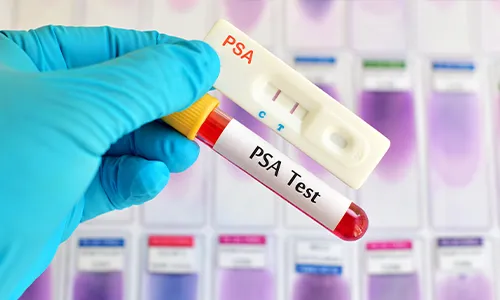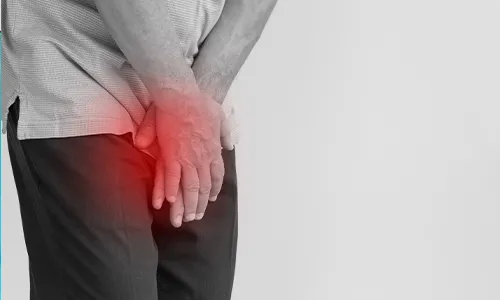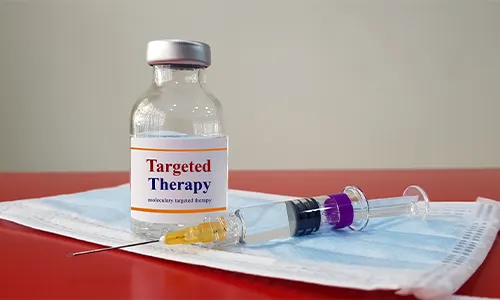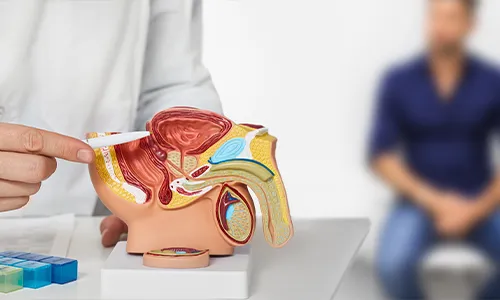



Prostate Cancer
Prostate cancer is one of the most common cancers among men after skin cancer, and it is the fourth-highest diagnosed cancer globally.
This life-threatening cancer develops in the Prostate gland that secretes seminal liquid. This liquid helps to transport and nourish sperm.
Some prostate cancers are indolent and do not spread very fast.
Some other types spread rapidly, cause an enlarged prostate, and need immediate medical treatment.


Risk Factors and Prevention
Age is the core risk factor for prostate cancer, mostly in the late fifties and above.
Along with age, prominent risk factors are:
- Family history of prostate cancer
- Less physical activities, poor dietary habits, and an unhealthy urban lifestyle
- Hereditary breast and ovarian cancer syndrome
- Genetic changes over generations
- Obesity
How can it be prevented?
- Improve dietary intake by adding fruits, vegetables, green tea, soy, etc
- Avoid fried and grilled meat
- Minimize saturated and trans fats, increase consumption of omega-3 fatty acids
- Regular exercise and a healthy BMI
- Avoid alcohol and smoking
- Stay sexually active and increase vitamin-D intake


Screening
Screening helps to find cancer before spreading and helps to provide timely and successful treatment.
Screening of Prostate cancer includes:
- Prostate Specific Antigen Test (PSAT)
- Digital Rectal Examination


Symptoms & Signs
Signs and symptoms of prostate cancer vary people to a person, and some men even do not experience any symptoms at all.




Common signs & symptoms
- Interrupted or difficulty while urinating
- Frequent urination, particularly during the night
- Difficulty in completing urination
- Extreme pain or burning sensation during urination
- Pain in hips, pelvis, and back
- Blood in semen or urine
- Ejaculation with pain
Note: These symptoms could be for some other disease also. If found any of these, consult a doctor now.




Diagnosis and Stages
After a diagnosis of prostate cancer through PSA testing, Digital Rectal Examination, Biopsy and Imaging tests, Doctors decide the severity of the disease, known as staging. It decides the seriousness of the disease and helps to prepare a treatment strategy.
Stage 1:
PSA levels remain less than ten and Grade group 1. At this stage, prostate cancer is curable and stays only in the prostate gland.
Stage 2:
The cancer spreads a little in stage 2 but still in the prostate.
It has three sub-levels: 2A, 2B, and 2C
PSA levels vary between 10 and 20. Grade group stays between 1 to 4.
Stage 3:
Cancer may have spread out of the prostate and reached other body parts. The third stage is divided into three sub-stages: 3A, 3B, and 3C.
Stage 4:
This is a high-risk stage where cancer advances further. It is divided into two sub-levels: 4A and 4B.


Treatment Methods for Prostate Cancer
- Active surveillance
- Radical Prostatectomy
- Radiation therapy
- Hormonal Therapy
- Chemotherapy
- Immunotherapy
- Targeted Drug Therapy


Life Post Prostate Cancer Treatment
- The prostate cancer treatment success ratio is high. The journey is stressful and exciting both. They need love, care, and support.
- It is common to worry about the recurrence of cancer or developing cancer in some other parts.
- It is advisable to attend therapy sessions for post-treatment patients.
- Request a follow-up treatment plan and attend all the follow-up appointments. It would help if you obeyed all the dos and don’ts recommended by your doctor.
- Doctors observe any new symptoms or residue of the previous ailment during follow-ups.
- Never ignore symptoms of recurrence and report to the doctor immediately if found.


FAQs
-
Is Prostate Cancer Curable?
Yes, it depends upon the stage of cancer. There are higher chances of recovery in the first stage and lower in the third or fourth stage.
-
How to detect Prostate Cancer if there are no Symptoms?
Screening at regular intervals helps to catch prostate cancer in the early stage without symptoms, and it is easier to cure during an early stage.
-
How common is Prostate Cancer in India?
It is alarmingly becoming common among Indian men aged 65 and above and has become the third most common cancer among Indian men.
-
How does Prostate Cancer develop?
According to the American Cancer Society, normal cells of prostate gland change into abnormal cells and start growing out of control which causes prostate cancer.
-
How would I know whether my prostate is growing faster or slower?
Consult a medical specialist for screening and diagnosis. It is tough to understand early on and could be life-threatening at advanced stages. Therefore, consult a doctor if you feel any symptoms.
Specialized Doctors at M | O | C
Find the nearest center
Cancer Centres
Mumbai
Pune
Rest of Maharashtra
Gujarat
Delhi NCR
Cancer Clinics
Borivali
+91 9920767626
Book Your Appointment



























.png)









.png)




















.png)
.png)
.png)



